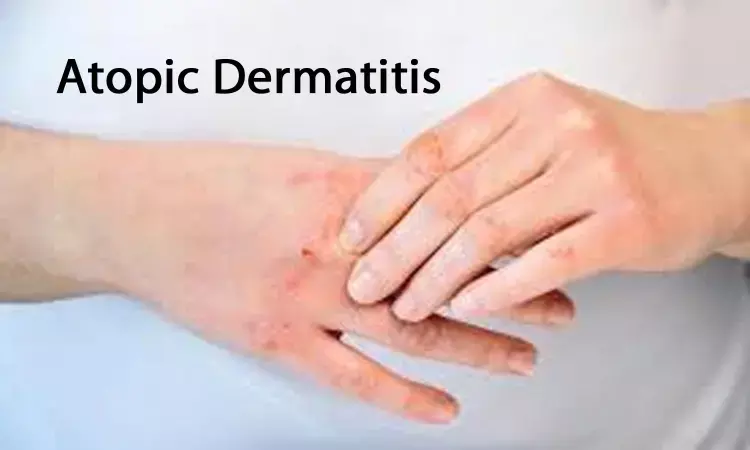- Home
- Medical news & Guidelines
- Anesthesiology
- Cardiology and CTVS
- Critical Care
- Dentistry
- Dermatology
- Diabetes and Endocrinology
- ENT
- Gastroenterology
- Medicine
- Nephrology
- Neurology
- Obstretics-Gynaecology
- Oncology
- Ophthalmology
- Orthopaedics
- Pediatrics-Neonatology
- Psychiatry
- Pulmonology
- Radiology
- Surgery
- Urology
- Laboratory Medicine
- Diet
- Nursing
- Paramedical
- Physiotherapy
- Health news
- Fact Check
- Bone Health Fact Check
- Brain Health Fact Check
- Cancer Related Fact Check
- Child Care Fact Check
- Dental and oral health fact check
- Diabetes and metabolic health fact check
- Diet and Nutrition Fact Check
- Eye and ENT Care Fact Check
- Fitness fact check
- Gut health fact check
- Heart health fact check
- Kidney health fact check
- Medical education fact check
- Men's health fact check
- Respiratory fact check
- Skin and hair care fact check
- Vaccine and Immunization fact check
- Women's health fact check
- AYUSH
- State News
- Andaman and Nicobar Islands
- Andhra Pradesh
- Arunachal Pradesh
- Assam
- Bihar
- Chandigarh
- Chattisgarh
- Dadra and Nagar Haveli
- Daman and Diu
- Delhi
- Goa
- Gujarat
- Haryana
- Himachal Pradesh
- Jammu & Kashmir
- Jharkhand
- Karnataka
- Kerala
- Ladakh
- Lakshadweep
- Madhya Pradesh
- Maharashtra
- Manipur
- Meghalaya
- Mizoram
- Nagaland
- Odisha
- Puducherry
- Punjab
- Rajasthan
- Sikkim
- Tamil Nadu
- Telangana
- Tripura
- Uttar Pradesh
- Uttrakhand
- West Bengal
- Medical Education
- Industry
Baricitinib- a long term treatment option for moderate to severe atopic dermatitis

According to recent research, investigators from the Department of Dermatology, George Washington University School of Medicine, Washington, DC have revealed that baricitinib, 4 and 2 mg, demonstrated sustained long-term efficacy in patients with moderate to severe atopic dermatitis.
The study is published in the JAMA Dermatology.
Baricitinib, an oral selective Janus kinase inhibitor, improved the clinical signs and symptoms of moderate to severe atopic dermatitis in the 16-week, phase 3 monotherapy studies, BREEZE-AD1 and BREEZE-AD2. Long-term efficacy has not yet been examined.
Therefore, Jonathan I. Silverberg and colleagues carried out the present study with the objective to evaluate the long-term (68-week) efficacy of baricitinib in adults with moderate to severe atopic dermatitis who were treatment responders or partial responders in BREEZE-AD1 and BREEZE-AD2.
Patients completing BREEZE-AD1/BREEZE-AD2 entered the ongoing, multicenter, double-blind, long-term extension study BREEZE-AD3. Responders and partial responders (patients achieving validated Investigator Global Assessment for Atopic Dermatitis [vIGA-AD] score of 0 or 1 [0,1], or 2) at BREEZE-AD1/BREEZE-AD2 completion remained on originally assigned treatment for 52 weeks (68 total weeks of continuous therapy).
The primary end point was the proportion of patients achieving a vIGA-AD score of 0,1 at weeks 16, 36, and 52 of BREEZE-AD3. Secondary end points included the proportion of patients achieving 75% or more improvement in the Eczema Area and Severity Index [EASI75] score and 4-point or more improvement in the itch numeric rating scale (NRS), using originating study baseline data.
Itch data were collected during the first 16 weeks in BREEZE-AD3. The last originating study visit was the first BREEZE-AD3 visit; therefore, data are presented for continuous weeks of therapy, including the 16-week originating study period. Missing data were imputed by last observation carried forward. Modified intention-to-treat analysis was used.
The following results were observed-
- Of the responder/partial responder population, the proportion of patients treated with baricitinib, 4 mg (n = 70) (mean [SD] age, 36.7 [15.5] years; 42 [60%] were men), achieving vIGA-AD (0,1) at week 16 was 45.7% (BREEZE-AD3 baseline) and, at week 68, 47.1%.
- Improvement of 75% or more in the EASI score was 70.0% at week 16 and 55.7% at week 68.
- The proportion of patients achieving an itch NRS improvement greater than or equal to 4 points at week 16 was 52.5% and, at week 32, 45.9%.
- Of the responder/partial responder population, the proportion of patients treated with baricitinib, 2 mg (n = 54) (mean [SD] age, 32.8 [12.7] years; 28 [51.9%] were men), achieving vIGA-AD (0,1) at week 16 was 46.3% and, at week 68, 59.3%.
- Improvement in the EASI75 score was 74.1% at week 16 and 81.5% at week 68.
- The proportion of patients achieving an itch NRS improvement greater than or equal to 4 points at week 16 was 44.2% and, at week 32, 39.5%.
Hence, it was concluded that "in this long-term double-blind extension study of 2 randomized clinical trials, baricitinib, 4 and 2 mg, demonstrated sustained long-term efficacy in patients with moderate to severe atopic dermatitis."
Dr. Nandita Mohan is a practicing pediatric dentist with more than 5 years of clinical work experience. Along with this, she is equally interested in keeping herself up to date about the latest developments in the field of medicine and dentistry which is the driving force for her to be in association with Medical Dialogues. She also has her name attached with many publications; both national and international. She has pursued her BDS from Rajiv Gandhi University of Health Sciences, Bangalore and later went to enter her dream specialty (MDS) in the Department of Pedodontics and Preventive Dentistry from Pt. B.D. Sharma University of Health Sciences. Through all the years of experience, her core interest in learning something new has never stopped. She can be contacted at editorial@medicaldialogues.in. Contact no. 011-43720751
Dr Kamal Kant Kohli-MBBS, DTCD- a chest specialist with more than 30 years of practice and a flair for writing clinical articles, Dr Kamal Kant Kohli joined Medical Dialogues as a Chief Editor of Medical News. Besides writing articles, as an editor, he proofreads and verifies all the medical content published on Medical Dialogues including those coming from journals, studies,medical conferences,guidelines etc. Email: drkohli@medicaldialogues.in. Contact no. 011-43720751


